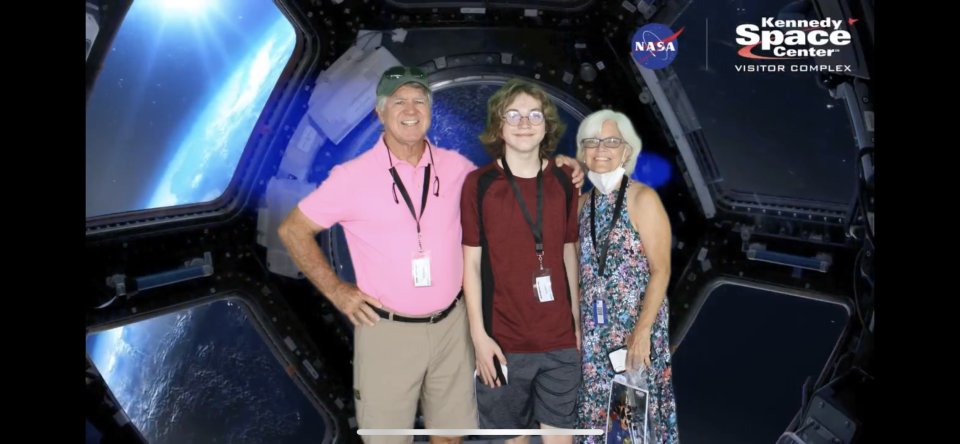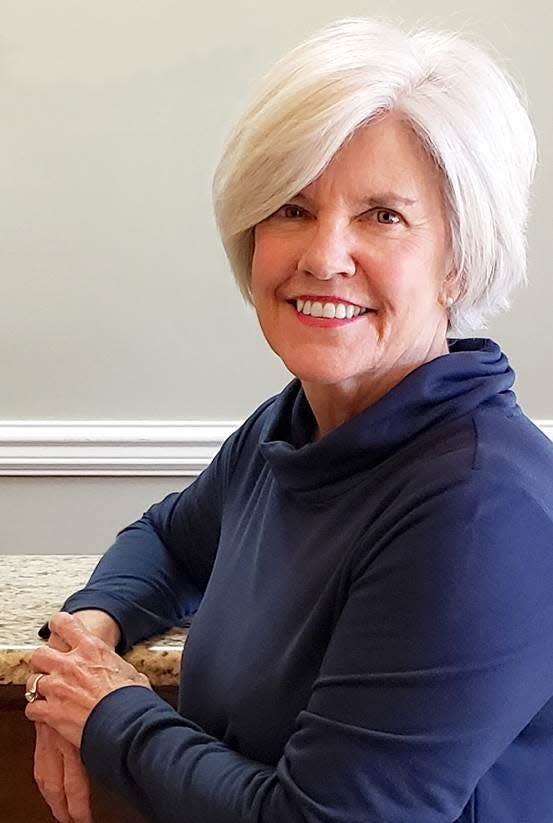NASA offers lesson in learning from failure while celebrating success | McKibben
In celebration of our grandson Rowen’s graduation from middle school, my husband and I took him this week on a trip we had long envisioned. As the current private investment in space travel has revived interest in space generally and created new opportunities for NASA, our grandson has become enthralled with space.
Acknowledging my grandmotherly bias, I believe his knowledge of the history of space exploration as well as his understanding of rocket science far exceeds his 13 years.
Which is what made our recent three-day trip to the Kennedy Space Center Visitor Complex in Merritt Island, Florida, so remarkable. Rowen’s palpable joy at all that he experienced made it worth the effort, and caused me to wonder why we had not made the trip sooner.
Eclipse of the moon : The moon's lessons: Early eclipse observations led to breakthroughs | McKibben
The Sky Guy: New image of the black hole stuns; 8 planets dance with the moon | The Sky Guy
Webb telescope: Powerful James Webb telescope already surpassing expectations | Sky Guy
We each had a prior visit to the Kennedy Space Center. My husband had visited the Space Center years ago in 1977 when his father retired from KSC after 40 plus years of service and again in the 1980s when Rowen’s father was young. I had visited briefly in 2014, with my daughter and son-in-law, enroute to Harry Potter World, and my grandson had visited as a preschooler.

Exploring passion for space
What made our recent visit so amazing was Rowen’s passion for space and the way his enthusiasm and knowledge piqued our own interest.
My husband, Rowen’s grandfather, has a deep relationship with Rowen, and the fact that Bruce grew up along the Space Coast, had a father who worked at Cape Kennedy along with several of his siblings, and had himself applied years ago to become an astronaut, certainly added to the joy for all of us.
The center is carefully designed with interactive exhibits and immersive experiences. It is highly educational and not only stimulates understanding but stirs inspiration. For me, the courageous role of women in the space program was meaningful.
We scheduled a “Chat with an Astronaut” for our second day and the astronaut for the day happened to be Anna L. Fisher, MD, who, though she dreamed of being an astronaut as a child, first trained and served as a physician, never imagining that the career of astronaut would be open to her as a woman, the first mom in space.
I was also moved by the diversity of the mission crews through the years, long before such diversity was mandated. In these days when the division in our families, communities, nation, and world seems so daunting, I felt emotional by the ways in which our lunar landing created a sense of oneness around the world.
Newspaper headlines and media coverage in the Saturn/Apollo center, where the Apollo rocket is on display, highlighted the sense of oneness that was felt in the world in the moment.
Struggles and failures
But what captured my heart most was the honesty of NASA in presenting the relatively brief history of space exploration in the United States. The struggles we faced and the failures we experienced in the risky venture of exploring the vast unknown were not ignored or excused, but acknowledged and honored.
In live film coverage, in memorial exhibits within the various buildings and gardens, in the compassionate ways in which the fallen are honored alongside those who experienced success, my heart was moved by the transparency in the portrayal of the history of the U.S. Space Program.
It is for me a shining example of leadership and decency that rather than attempting to present a rosy picture of every effort made, the space center has chosen to give an accurate portrayal of the ways in which any risky endeavor holds within it the possibility of failure.
I am grateful for the sensitivity of those who designed the exhibits to both acknowledge the important work of those astronauts who died in serving the space program and to keep their memory alive. I was moved by learning of the long years of working on projects that failed over and over before finally finding the right combination to enable success, never valuing expediency over safety.
Human endeavors
I feel proud of our country, as represented by the space program, that we are telling the true story of what it means to be human.
In the Astronauts Memorial Garden, a granite monument reads: “Whenever mankind has sought to conquer new frontiers, there have been those who have given their lives for the cause. This Astronauts memorial, dedicated May 9, 1991, is a tribute to American men and women who have made the ultimate sacrifice believing the conquest of space is worth the risk of life.”
NASA astronaut Dr. Charles Camarda believes that the tragic loss of life through the years of the space program has provided both current and future engineers a motto to live by, “Where there is failure, there is knowledge and understanding that doesn't come with success.”
This commitment to learn from failures both small and tragic is a noble part of the human story, and it is one way that NASA honors all the many men and women who have made our space program a reality.
A learning experience
A motto associated with Apollo 13 and prominent on merchandise in the NASA gift shops at the Visitor Center complex seemed to me to contradict this commitment.
“Failure is not an option” is emblazoned on T-shirts, coffee mugs, mouse pads, and posters. What I have learned is that this line from the popular 1995 Apollo 13 movie starring Tom Hanks, and attributed to Gene Kranz, NASA’s second chief flight director, was not a statement the NASA aerospace engineer made.
Rather, he said in an interview in preparation for the film, responding to a question about how mission control handled difficult moments, “When bad things happened, we just calmly laid out all the options, and failure was not one of them.”
Which sounds to me more like a commitment to doing everything possible to avoid failure than an unwillingness to learn from it when it happens.
In a blog on the NASA website honoring the 2019 50th anniversary of the Apollo moon landings, the writer concludes, “Everyone makes mistakes, but repeated failure is not an option!”
I like this take and am grateful for the ways in which our recent trip to the Kennedy Space Center Visitor Complex brought such joy to our grandson and to us as we experienced his excitement.
I appreciate that he came away affirmed for his interest in STEM and space, but also a wiser human in understanding the way we approach life’s failures matters. I pray we all can commit ourselves to learning from failure even as we celebrate success.

The Rev. Candace McKibben is an ordained minister and pastor of Tallahassee Fellowship.
Never miss a story: Subscribe to the Tallahassee Democrat using the link at the top of the page.
This article originally appeared on Tallahassee Democrat: NASA visit brings lesson in learning from failure, celebrating success

